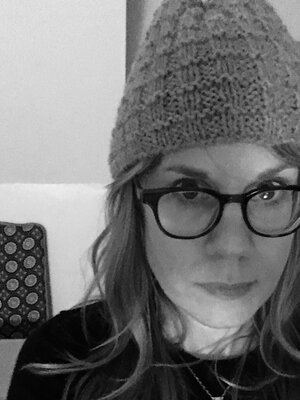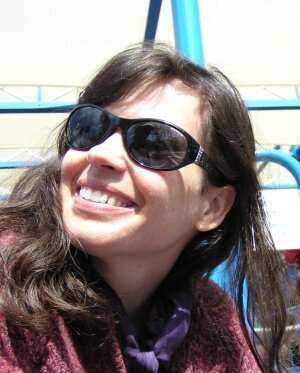Barely There
by Julia Story
I had touched the weeping
birch in the cemetery so many
times that there was a small
mark, a grease mark or worn
place where my hand had
rested, trying to feel the
spinning that connected it
to some invisible underground
pathway. The cranial sacral
therapist told me it would feel
like humming and that the corpses
who branched underneath me
like a flattened tree reduced to
its bones would not bother me,
would only bring power
and courage to the birch
and then maybe to me. Across
the street from this cemetery
is a house I’ve walked by
many times. I’ve looked in
its windows on days when
the sun is unrelenting
and, unwilling to pay for gas
to take me to the crowded
pond or the poor peoples’ ocean,
I head for the cemetery where
there is at least some shade.
The house is so dark inside
with its low ceilings and hydrangea
bushes and laden trees outside it.
It looks cool in there. The family
I’ve asked to populate it, for just
a few minutes, is tender, is barely
there. A hint of legs on stairs,
a see-through coffee cup held
aloft by an almost-hand, no
coffee going into it. Plants
with light shot through them,
secret corners with sealike
breath. Only the dog is fully
there, in the back of the house,
sleeping with her head on her
white paws. The quiet shuffling
of my family waiting for me.
They decide to let me be there
for a minute among them and
I lean away from an invisible
hallway, not wanting to touch
anything or to destroy what isn’t
really mine, but how do you
move without moving toward
things or people. Or why
would you move without them.
Previously published in Salamander Magazine (Issue 39) and Spinster for Hire (The Word Works, 2020)
* Poet’s Writing Prompt: Take a moment to picture a place you’ve been many times. Fully immerse yourself in this place, allowing yourself to see all of it, including anything that might be on the periphery of your memories about it (a door, a person, a distant tree). Allow yourself to go into a peripheral image (in “Barely There” this image is the house across the street from the cemetery) and write down as many associations as you can about it. Go deep. This list can simply be what you imagine about this image). Then write a poem that connects the familiar place to this less familiar image that exists on the edge of your life.
Portmanteau Prayer for Moms
by Beth Suter
lord, grant us the shelter of strangers
where no one needs us to be animute,
invisociable as an old retriever
give us room to braid our three halves
into a horse’s tail, lord, let it be a draft horse
a kindred effectionate creature
grant us a winter greenhouse, lord,
protect our tender starts before
we must be independable again
Previously published in Salamander Magazine (Issue 50)
* Mass Poetry’s Writing Prompt: As expansive as language is, it might still fail us. In fact, it often does—life is rife with contradictions, ambivalence, or opposites. What are words that come close, but do not quite, describe your thoughts, feelings, and experiences? Make a list of 10-15 such words. Give yourself permission to smash them together into portmanteau’s. Say them out loud to yourself. Give these words a home in a poem and resist the urge to explain them.
This issue of The Hard Work of Hope is produced in partnership with Salamander Magazine.

Julia Story
Julia Story is the author of Spinster for Hire (the Word Works) and Post Moxie (Sarabande Books) and the chapbooks The Trapdoor (Dancing Girl Press) and Julie the Astonishing (Sixth Finch Books). Her work has been awarded a Pushcart Prize and has appeared in many publications including Diode, Ploughshares, The Paris Review, Sixth Finch, and The New Yorker. She is from Indiana and now lives in Massachusetts.

Beth Suter
Beth Suter studied Environmental Science at U.C. Davis and has worked as a naturalist and teacher. A Pushcart Prize and Best of the Net nominee, her poems have appeared in Colorado Review, Barrow Street, DMQ Review, Poet Lore, and Birmingham Poetry Review, among others. She lives in California with her husband and son.
